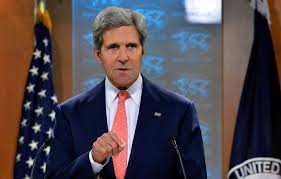World powers have been pushing for a halt in fighting in Syria that was meant to take effect by Friday, but have struggled to agree on how it should be implemented.
 World powers have been pushing for a halt in fighting in Syria that was meant to take effect by Friday, but have struggled to agree on how it should be implemented.
World powers have been pushing for a halt in fighting in Syria that was meant to take effect by Friday, but have struggled to agree on how it should be implemented.
US Secretary of State John Kerry said a provisional deal had been reached on the terms of a truce, as violence intensified on the ground.
Kerry said he had spoken with Russian counterpart Sergey Lavrov and agreed on how to implement a ceasefire.
"We have reached a provisional agreement, in principle, on the terms of the cessation of hostilities that could begin in the coming days," Kerry said in Amman.
"It is not yet done and I anticipate that our presidents, President (Barack) Obama and President (Vladimir) Putin, may well speak somewhere in the next days or so in order to try to complete this task," he added.
World powers proposed the truce just over a week ago as part of a plan that also included expanded humanitarian access, in a bid to pave the way for the resumption of peace talks.
The talks, which collapsed earlier this month in Geneva, were scheduled to resume on February 25, but the UN's envoy on Syria has already acknowledged that date is no longer realistic.
On Saturday, a key opposition umbrella group, the High Negotiations Committee, said it would agree a temporary truce only if forces allied to the Syrian army halted fire.
HNC chief Riad Hijab said any ceasefire must be reached "with international mediation and with guarantees obliging Russia, Iran and their sectarian militias and mercenaries to stop fighting".
Syrian President Bashar Al-Assad meanwhile told Spain's El Pais newspaper that he was "ready" for a ceasefire, but said it should not be exploited by "terrorists".